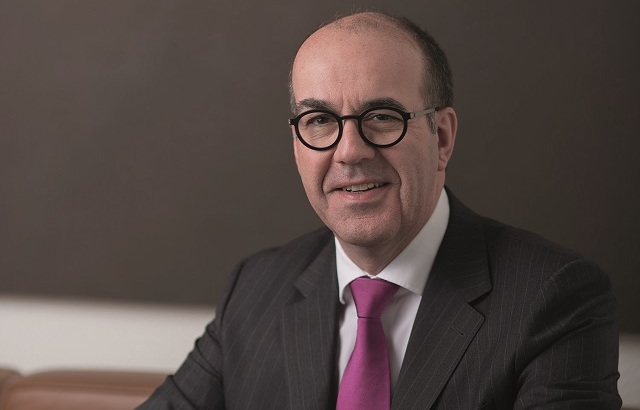Investors should fasten their safety belts and prepare for a rodeo-style ride in July and August, warns Indosuez Wealth Management head of global market and investment solutions, Frédéric Lamotte. Britain, Europe and the US all face political instability, while China and Japan are struggling with reforms, and a global liquidity crisis hovers on the horizon.
Lamotte’s asset allocation for his balanced portfolio reflects this sentiment, with a chunky 30% in cash to provide liquidity and to take advantage of the opportunities he expects to arise in volatile market conditions. He says: “I have to face all my investors. Some ask: ‘Why the hell do you keep so much cash?’ I reply: ‘Cash is also an investment strategy’.”
Navigating turbulence
Lamotte has plenty of experience to navigate such turbulent times, having been with the French banking group Crédit Agricole for his entire career, spending 14 years in its derivatives trading rooms before joining its private banking arm in 1999.
His career has had an international flavour, working first in Saudi Arabia, moving to Singapore and then Tokyo, where he oversaw the group’s capital market business. Taking responsibility for the Swiss product services business and subsidiaries in 2007, Lamotte’s remit was extended to operations worldwide in 2011.
And in January, under Lamotte’s leadership, Crédit Agricole’s private banking division was rebranded Indosuez Wealth Management, bringing together its wealth management units.
He says: “All the product lines have been grouped together and the investment committeehas been unified at a worldwide level.”
Lamotte says Indosuez has a significant number of ultra-high net-worth clients, adding: “For a very French bank, this is quite an achievement.” There are about 1,800 billionaires worldwide, 600 of whom are in the US, which, he says, Indosuez “does not touch”. This leaves about 1,200 billionaires, of whom the private bank has more than 10%as clients.
Lamotte is based in Geneva, Switzerland, but the business also has offices in Asia, the Middle East and the Americas.“
The challenge for me as a chief investment officer is to have everybody contributing to the overall investment strategy,” he says, “to make sure that when the decision is taken, at least everybody feels they have been involved.”
An exercise in allocation
So how active is his approach to asset allocation? Lamotte says there is a two-layered investment committee that each month holds a day-long exercise. Initially, contributionsare invited from across the firm but then these are sifted by a team of senior staff.“
A very small team sits around a table. We take what has been contributed globally, asset class by asset class, market segment by market segment, geography by geography, to try and make something out of that and come up with the decisions that are then applied through various investment vehicles.”
He adds it is important for people on the ground to have the freedom to be able to adapt an investment strategy in order to meet local requirements.“
We have some large clients giving us very specific mandates. Let us say somebody wants a long-term, high-yield bond portfolio. In our investment strategy, we say we have reduced the duration of our portfolio of high-yield bonds. Nevertheless, we will manage that specific mandate for that client.”








